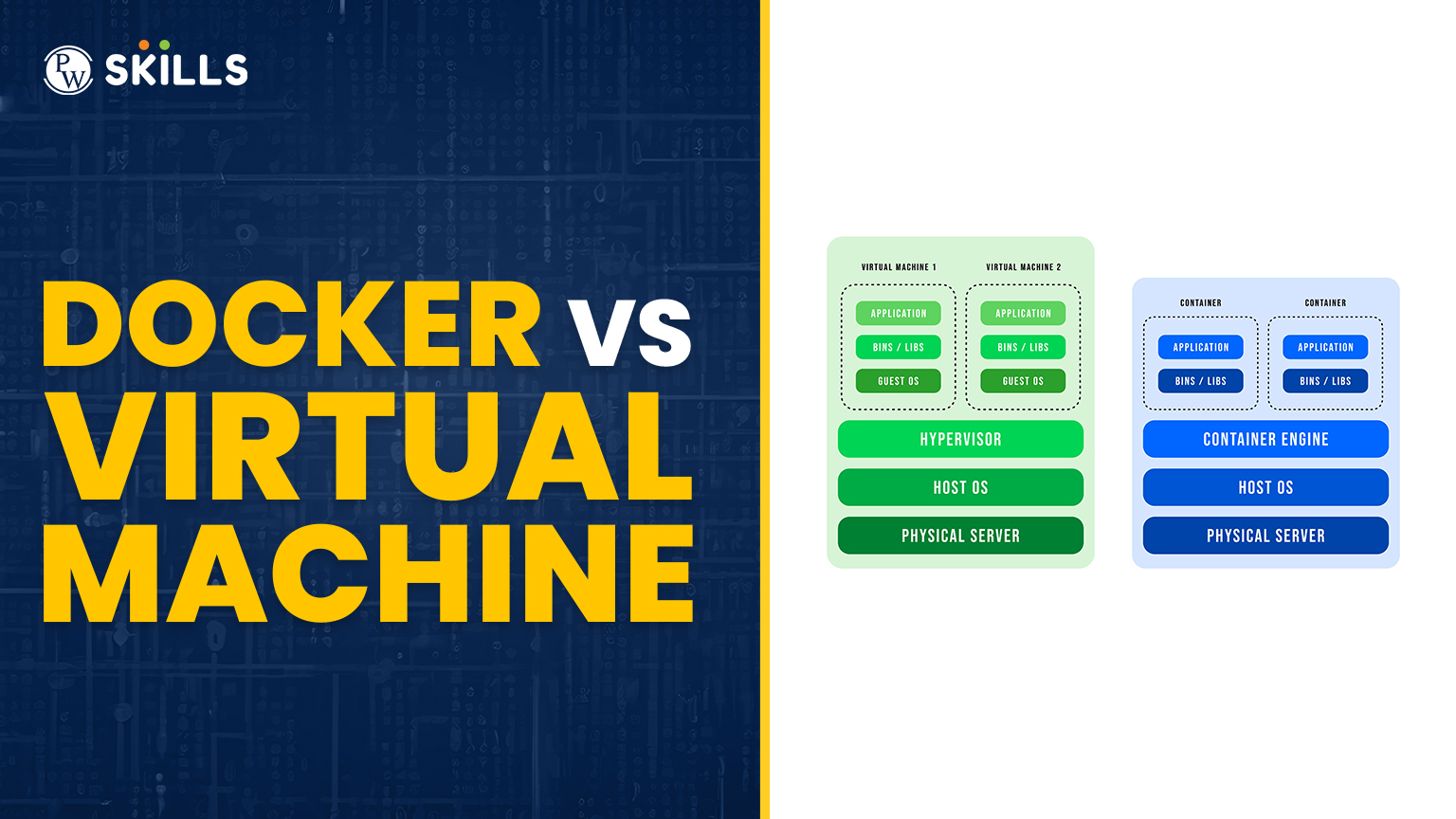Docker vs Virtual Machine: Technology does have a funny way of reinventing itself. In the past, to run multiple applications, you set up different machines. Then came VMs, where you could create multiple operating systems on the same computer. Just when people thought this was quite a bit of magic, Docker containers arrived with the comment, “Hold my beer.”
In this article, we attempt to delve into the fascinating face-off: Docker vs Virtual Machine. We’ll learn about Docker vs Virtual Machine, describe how they work, and highlight why they matter so much to enterprises and developers, not to mention where each one wins. This breakdown is for you, whether you are a student putting a toe into DevOps or a professional making lateral career moves.
Docker Explained for Beginners
Docker is like a shipping container for software. Just like a shipping container can carry clothes, electronics, or furniture and still be stackable or portable, similarly, Docker “containers” carry applications with all their dependencies.
So, no “it works on my machine” excuses anymore. Docker makes sure that your app behaves the same way on your laptop, in the cloud, or on someone else’s machine.
- Super lightweight: Containers share the same OS kernel.
- Super portable: Move apps across environments with no sweat.
- Super fast: Start and stop container in seconds.
What is Virtual Machine Like?
Suppose you rent a big house: the physical server. You split the server into many apartments. Each apartment has its own electric meter, water supply, and locks. That’s a virtual machine.
- Each VM runs a full-fledged OS.
- VMs require a hypervisor (such as VMware, VirtualBox, or Hyper-V) for their administration.
- They’re absolutely isolated, heavily secured, and rather good when load is high.
- In a nutshell, VMs are bulkier while being self-efficient.
Docker vs Virtual Machine Architecture Explained
The principal contrast between docker vs virtual machine pertains to architecture.
Architecture For VM:
Hardware→ Host OS→ Hypervisor→ Guest OS(Windows/Linux)→ Application
Architecture For Docker:
Hardware→ Host OS→ Docker Engine→ Containers→ Application
You see Docker eliminates the Guest OS layer? That is just why containers are way faster and lightweight app performance as compared to VMs.
Performance Comparison: Docker vs Virtual Machine
This is where things become quite heated under performance assessment. Lets see what is difference between docker and virtual machine.
- Boot time: VMs can take minutes to boot, whereas Docker containers can spin up in seconds.
- Resource Utilization: A VM allocates memory and CPU by duplicating the entire OS. Docker containers utilize the host OS for maximum resource efficiency.
- Scalability: Docker is best for quick scaling and microservices; VMs are best for full OS deployments or when legacy compatibility is required.
- Think of it this way: When it comes to the toolbox of work theory, VM equals SUVs – big, spacious, and heavy-duty. Docker containers are the other end – motorcycles – fast, nimble, and fuel-efficient.
![]() Join Our Devops & Cloud Computing Telegram Channel
Join Our Devops & Cloud Computing Telegram Channel
![]() Join Our Devops & Cloud Computing WhatsApp Channel
Join Our Devops & Cloud Computing WhatsApp Channel
Advantages of Docker Over Virtual Machines
So why does everybody keep talking about Docker? Below are some reasons to outline docker vs vm performance comparison.
- Efficiency: One server can run hundreds of containers where a few VMs can fit.
- Portability: A container image works the same across laptops, cloud servers, or Kubernetes clusters.
- DevOps Friendly: CI/CD pipelines love Docker for its fast build and deploy.
- Lower Costs: With lower resource consumption = lower cloud bills.
When to Use Docker vs Virtual Machine
In the real world, it’s not about “which is better?” but rather “which one fits best?”
Use Docker when:
- Building microservices
- Running modern cloud-native apps
- Where speed and scalability are the need for the hour
- You require portable development environment
Use Virtual Machines when:
- Running legacy apps
- Strong isolation and security are indispensable
- Different operating systems are required on same hardware
- On resource-hungry workloads (like databases)
Real-World Applications: Docker vs Virtual Machine
Docker in Action:
Netflix, Spotify, and Uber all use Docker for microservices, scaling fast during high demand.
VMs in Action:
Banks, healthcare systems, and government agencies still rely on VMs because of their rock-solid isolation and compliance benefits.
The takeaway? Both coexist in modern infrastructure.
Docker vs Virtual Machine Utilization
Containers take coffee; VMs gulp energy drinks! Here’s why:
- Docker containers share kernel, saving RAM and CPU cycles.
- VMs replicate entire operating systems, which eats resources.
- For hundreds of small services, Docker wins.
- For fewer but heavier apps, the VMs make sense.

Mini Coding Example: Running a Web App in Docker
Want to see some magic by Docker? Let’s run a simple Python web app.
Dockerfile:
FROM python:3.9
WORKDIR /app
COPY app.py .
RUN pip install flask
CMD [“python”, “app.py”]
Run it as:
docker build -t flask-app .
docker run -p 5000:5000 flask-app
Boom! You just deployed a Flask app inside a container.
Common Mistakes Beginners Make in Docker vs Virtual Machine
- Running Docker inside a VM for no reason (it slows everything down).
- Completely forgetting to remove images or VMs that are just sitting there (hi, full disk).
- Using Docker for workloads that should have full VMs (like running Windows apps on Linux).
- Not hardening Docker—the containers share the same kernel, so that misconfiguration might become a security issue.
Stepwise Learning Path: Mastering Docker vs Virtual Machine
- Learn Basics of Virtualization: Understand hypervisors and how VMs work.
- Install Docker: Run simple applications inside containers.
- Play with Docker Compose: Manage multi-container applications.
- Learn Kubernetes: Orchestration for containers at scale.
- Experiment with Cloud Providers: AWS, Azure, and GCP support both Docker and VMs.
- Build a Project: Try deploying a microservice with Docker + a database in a VM.
Career Opportunities and Salary Insights
In fact, the Docker and the VMs play an important role in the work area of DevOps, Cloud Engineering, with a bit of Site Reliability Engineering (SRE) work attached.
- India: DevOps engineers typically make between ₹8-18 lakh a year. A Senior engineer would be expected to earn over ₹30 LPA.
- US: Average DevOps engineer salary is $100,000–$140,000/year.
- Bonus: Mastery of both Docker and VMs makes you versatile-every employer likes that.
Future is containerized; VMs will still occupy an important space. Think of it: learning them both is preparing your future with your career.
Why Learn Docker vs Virtual Machine
- Containers are bringing about modern cloud applications.
- VMs would continue to be the backbone of enterprise IT.
- Knowing both means you have the right tool for the right problem.
- Employers now insist on hands-on training in Docker and Kubernetes, as well as virtualization platforms.

Troubleshooting Tips
- VM is slow? Assign more RAM/CPU in your hypervisor.
- Network issues? Docker containers often need custom bridge networks.
- Disk space full? Prune unused images (docker system prune).
Docker vs Virtual Machines: The Future
The future isn’t Docker vs VMs, it’s Docker and VMs. Many companies actually run their containers inside VMs. Therefore, there’s flexibility plus isolation. Hybrid models, cloud-native platforms, and edge computing technology are going to keep both alive for a long time.
PW Skills DevOps Course: Your Gateway to Mastery
Want to go from being a novice to being an expert in Docker, VMs, Kubernetes, and much more? Join the PW skills DevOps course with hands-on learning, real-world projects, and mentorship of industry experts.
Yes. Docker containers start up in seconds as compared to full-fledged operating systems-which run VMs that use a lot more resources-since they share the host OS. No. Although Docker creates lightweight, scalable applications, it will not substitute for legacy applications that need more strong isolation. Most use both. Sometimes early-stage startups are preferred as they are agile, while large enterprises prefer heavy compliance workloads to keep working with VMs. In my opinion, start from VMs so that you can know the basic things about virtualization; then introduce Docker for modern cloud-native development.Docker vs Virtual Machine FAQs
Is Docker faster than a virtual machine?
Can Dockers completely replace the VMs?
Which one do the companies prefer-customer-specific Docker or VMs?
What should I learn first-Docker or virtual machines?


